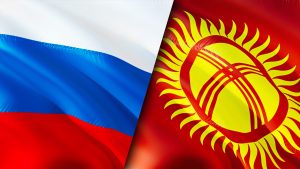On March 7, Kyrgyz media outlet 24.kg shared images of two police buses parked outside the Russian Embassy in central Bishkek. The Russian embassy, which stands between two coffee shops on a busy street a few blocks from Ala-Too Square and various government buildings, has been the site of several rallies in recent weeks: Some opposing the Russian invasion of Ukraine and others supporting Russia’s “special military operation.” So far the demonstrations have been modest for a city that’s seen its share of large protest movements, but the authorities are clearly spooked.
On March 14, local media began reporting that a court in the capital city had issued a ban on protests near the Russian embassy, at Ala-Too Square, and near the White House and presidential administration buildings from March 11 to April 11. Demonstrations would be permitted, however, at nearby Gorky Park.
Officially, Kyrgyzstan has tried to maintain a neutral stance, though President Sadyr Japarov has made comments via social media that appear to lend support to Russia. In a February 22 Facebook post, Japarov expressed concern about the situation in Ukraine and commented on Russia’s February 21 recognition of the Donetsk People’s Republic and Luhansk People’s Republic: “Perhaps it was a necessary measure to protect the peaceful population of the territories of Donbass, where a large number of Russian citizens live. I would like to point out that it is the sovereign right of any country to recognize a state.” On February 26, Japarov spoke via phone with Russian President Vladimir Putin.
The Kyrgyz Foreign Ministry has been more circumspect, releasing a statement of concern on February 25 — the day after the Russian invasion began — noting Kyrgyzstan’s historically friendly relations with both Russia and Ukraine and urging a start to negotiations, without stating its interpretation of what was actually happening to cause so much concern. Kyrgyz officials have talked with a variety of other diplomats in the weeks since, including a February 28 virtual meeting of the C5+1, which included the five Central Asian foreign ministers and U.S. Secretary of State Antony Blinken. Kyrgyz Foreign Minister Ruslan Kazakbaev met with Russian Foreign Minister Sergei Lavrov on March 5 in Moscow, where Kazakbaev called Russia a strategic partner.
Domestically, the authorities are arguably on edge. The economic fallout of the Russian invasion of Ukraine has already begun to weigh down Central Asian currencies and is expected to shrink remittances dramatically. In addition, Russia has banned the export of grain to fellow Eurasian Economic Union (EAEU) states through the end of the summer. Russian authorities phrased the ban on exports as marginal, given that partner states had already purchased what they needed; Central Asians may view the ban differently as food prices rise.
The ban on rallies near the Russian embassy and Ala-Too heads off obvious flashpoints for modest protests to evolve.
On March 14, 24.kg reported that former head of the Internal Affairs Department of Osh region, Abdylda Kaparov, had ridden a horse into Bishkek. Donning a kalpak, holding a Kyrgyz flag, and wearing a picture of Putin on his back, Kaparov staged a one-man picket in support of Putin. Given the ban on demonstrations, he was escorted to a police station and released after a conversation, per media reports. Other early March news reports claimed that police had begun to find drivers with “Z” stickers, which mirror the markings painted on Russian military hardware in Ukraine and are viewed as expressions of support for the invasion.
More troublingly, on March 3 a private TV station — Next TV — owned by opposition politician Ravshan Dzhenbekov was raided by police after repeating claims made by an exiled former Kazakh intelligence official that Kyrgyzstan and Tajikistan had secretly agreed to provide military support for Russia’s invasion of Ukraine.
There have been no official reports to that effect, although there have been similar comments made elsewhere suggesting that Russia requested assistance from Central Asian states.
Next’s director, Taalaibek Duishenbiev, was detained, with the State Committee for National Security launching an investigation into charges that the station incited “interethnic hatred.” Two of the station’s journalists were questioned on March 7.
Dzhenbekov has faced his own legal troubles and in late December 2021 was released from jail, although charges stemming from the Koi-Tash events of 2019 are reportedly still pending.
As the war in Ukraine drags into its third week with no clear end in sight, the balancing act in Bishkek will continue. The ban on demonstrations at some of the capital’s most iconic protest spots is a clear effort to keep protests, both for and against Russia, manageable and limited.

































